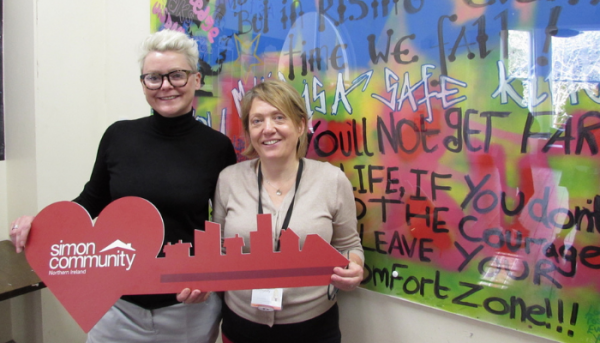Wilma Henderson talks to nijobfinder and discusses how she became a Service Manager at Simon Community NI.
Find out how she became a Service Manager at Simon Community NI
Give a brief outline of your career to date
After leaving university, I moved to London and spent eight months working as a volunteer for a charity that supported those with disabilities to live independently. From this, I moved on to working as a support worker for a few years in a rehab unit for young people with epilepsy.
Living in London, street homeless was very visible and when I saw an opportunity to join a large homeless charity I applied. I joined as a support worker in a 98-bed hostel, working my way up to Service Manager and in 2017, relocated to Northern Ireland where I temped with various charities. I knew my passion lay within the homelessness sector and when the position for a youth accommodation project Service Manager arose in 2019, I jumped at the chance of joining Simon Community.
What was your favourite subject at school?
I enjoyed studying Sociology at O level, which ultimately was the subject that lead to my career in the social care field.
Did you go on to further/ higher education, if so, what did you study and where?
I completed a BA Hons in Applied Social Science at Humberside University. Within my job roles I have had the opportunity to complete various courses including an NVQ 4 in Health and Social Care and a Postgraduate in Housing.
Is this what you always wanted to do?
I always knew I wanted to do something to help others and working with marginalised young people provides me with a real sense of satisfaction.
Were there any particular essential qualifications or experience needed?
Having a degree and/or managerial experience working in the field is vital for the role.
Are there alternative routes into the job?
Simon Community offers entry-level positions for people wishing to get a footing in the sector and provides a lot of training to help individuals develop professionally.
What are the main personal skills your job requires?
Empathy, active listening, good communication skills and great organisational skills are a must.
What does a typical day entail?
What I really enjoy is that there is no typical day. Although there are routine tasks to be completed, you are responding to the needs that individual clients present with. As a manager, I also carry out supervisions, attend meetings with external professionals such as Social Workers and ensure that my team provide high quality shelter and support to young people.
What are the best and most challenging aspects of the job?
The best aspect of the job is seeing a young person achieve one of their goals. We work with young people who have experienced very complex trauma and seeing a young person in distress can be very difficult. However, we always have staff available to support the young person through this.
Why is what you do important?
I’m passionate about ensuring young people are provided with the support they need to continue on to live happy and healthy lives.
What advice would you give anyone looking to follow a similar career path?
In addition to gaining qualifications and experience in the health and social care sector, my advice would be to get to know what the work is like. Volunteer or join at entry-level to get a taste for the career, take advantage of all the training on offer and don’t be afraid to highlight to your line manager when you’re ready to professionally develop.
If you weren’t doing this what would you like to do?
I often imagine myself as a midwife, which I feel would equally be a challenging but rewarding career.
What is the one piece of advice you would give to yourself on your first day?
Listen, observe and ask as many questions as you want.
Describe your ideal day off.
My perfect day off is always centred around my home. If I’m not with my family or walking the dog, then I’m happily curled up on the sofa reading a book or watching a film.
And finally, what’s the key to any successful job search?
Preparation is vital at both application and interview stages. Spend some time on the employer’s website getting to know them and their work, read over job specifications to see if the role is right for you, read your application before submitting and always remember to read it again before your interview.
Did you know Simon Community NI is hiring? View the latest jobs on nijobfinder.
Follow nijobfinder on Facebook, Twitter and LinkedIn to see the latest jobs and to ensure your dream job won’t pass you by.


